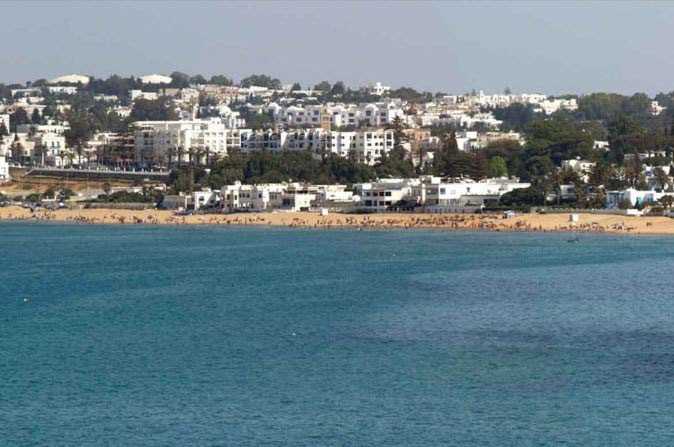Economy / Tunisia
The welcoming shores of change
It was in a small and peaceful country that the spark that lit the fuse of the Arab Spring was set off. Although it was admittedly the cradle, we should expect Tunisia to follow its own path.

La Marsa, an elegant seaside suburb of Tunis
Two years after the departure of President Ben Ali, Tunisia exhibits different facets: this land of tolerance, a crucible of influences and cultures, has undertaken profound reforms: from a political blossoming to building institutions, from a national awakening to seeking its own identity, the process of post-revolutionary reconstruction is under way.
After decades of authoritarian regime, the creation of political parties, currently numbering 21, bears witness to the high aspirations of the Tunisian people. The democratic liberation has naturally led to a political effervescence in which no overriding tendency can as yet be discerned.
During its period in hiding and exile, the Ennadha party, an Islamist organisation, was able to consolidate itself as an organised political force with financial resources and a media following: it was there-fore no surprise that it came out as the leading political party in 23rd October 2011, taking 40% of the vote in the election of a constituent assembly.
Freedom of the press and a proliferation of associations are among the achievements of the Tunisian revolution. These breakthroughs, which still need to be tempered by the experience of a democratic learning process, are the seeds for consistent counterpowers and the construction of a stable state.
A society in search of balance
Tunisia distinguishes itself from its Maghreb neighbours by its specific identity as a strongly westernised Arab-Muslim country, a forerunner of social progress: its schooling rate is close to 100%, it has a high percentage of graduates (75% of high school and 35% of higher education graduates), and women’s rights enjoyed since independence.
Part of the opposition is keeping a watchful eye against any breach of these freedoms – a clear sign of the powerful foothold that these rights have gained on the Tunisian mentality.
As regards the sometimes ostentatious expressions of religious adherence, these are still marginal. Although they may have come as a surprise to the usual observers of Tunisia, they reflect a need to seek refuge in old values in times of turmoil rather than a withdrawal to an identity that has little to do with the Tunisian mentality.
A likely takeoff
The change in regime and the ensuing institutional hesitation obviously created a climate of uncertainty unfavourable for economic growth, but Tunisia has all it takes to ensure a swift recovery. In 2012, its growth exceeded 3%, and the country set itself a target of 4.5% for 2013, even if the burden of debt, at 49% of GDP, could hinder that goal.
Small countries with limited resources base their economic dynamism on the implementation of powerful assets: investment in knowledge, incentives to foreign investment and exports. Tunisia belongs to this category: it can count on exportable wealth (oil, phosphates, olive oil, citrus fruits), it is well versed in many production techniques for the export market, it has trained experts in new technologies and boasts a wealth of experience in the tourism industry – an activity that has become a tradition.
Agriculture offers genuine prospects, while industry and the service sector possess proven human and technological capabilities. As for tourism, it is the great provider of foreign currency and indirect employment. All it needs is shrewd investors to focus on several market niches (culture, sport, luxury products), and give it a new breath of life.
Knowledgeable economists and businessmen agree on the need to focus on high added-value investments, while at the same time undertaking projects that create jobs, thus curbing unemployment, the breeding ground for greatest unrest. Tunisia is capable of providing skilled workers, hard-working executives and bold managers.
Undoubtedly, the lust for freedom after January 14th has spawned social demands that are sometimes excessive. Certain partners of Tunisia have found this disquieting. However, one can also see the need for reforming labour and investment regulations in order to provide modern, fair and efficient institutional frameworks.
Economic inequalities, arising from a lack of opportunities suffered by inland areas, are the main reason behind the frustrations that led to the Tunisian revolution. Many young graduates from those areas are willing to galvanise their regions. The expectations from these ‘forgotten’ areas, in the west and south, still burn strong, and the economic rebalancing will need to focus on them.
Enduring appeal
The country boasts a huge wealth of attractive proposals, a diversity of regions full of charm and contrasts: the north is rural, with beaches that stretch as far as the eye can see, the south is full of bewitching oases, cities with typically charming suburbs; there are high-quality communication and leisure infrastructures; the people are hospitable, multilingual and sharp. It is also close to Europe, an attractive advantage for prospective visitors.
Tunisia is a bridge between Europe and Africa, the Maghreb and the Far East. It has fewer contradictions than wealth, more wonders than uncertainties.
